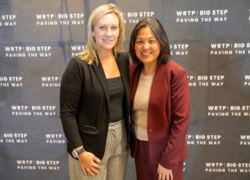Christina Coleman-Lovelace is a community outreach and resource planning specialist at the Wage and Hour Division’s Birmingham, Alabama, District Office. In November 2021, Secretary of Labor Marty Walsh met with residents and union workers in Birmingham where he announced a rule increasing the minimum wage for federal contract workers to $15 an hour. We asked Christina to share how her family’s civil rights legacy inspired her career in public service.
What is your relationship to the civil rights movement and the history of Birmingham, Alabama, where you were raised?
I come from a long line of entrepreneurs, educators and advocates who, in the face of tremendous injustice, worked to improve their communities and the lives of African Americans around the country. My fifth-generation grandfather was Lewis C. Adams. He was instrumental in recruiting Booker T. Washington to come to Tuskegee Institute, now Tuskegee University, a prominent historically black college and university. Mr. Washington ate his first meal at my grandmother’s home upon arriving in Tuskegee, Alabama, and even lived there for some time. My grandfather went on to teach harness making at Tuskegee University and has a campus dorm named after him, along with an elementary school.
My mother and her siblings grew up in Birmingham – the most segregated city in the country at that time – in the middle of the civil rights movement when life for African Americans was dangerous and unjust. In May 1963, two of my uncles participated in the historic Children’s March where police officers turned the water hoses and German Shepard dogs on the demonstrators. This was a pivotal moment in our country’s fight against institutionalized racism as well as a major legacy of my family’s activism.
Source: Library of Congress
I recall sitting at my grandmother’s dinner table surrounded by my mother, aunts and uncles who told stories of how they suffered in that era: They had to eat in segregated establishments and ride in the backs of busses. I remember feeling outraged hearing my mother describe how they had to move to the back of the bus or remain standing in order to give their seats to white people.
The telling of these stories shapes our identities and is an important tradition of how we pass down generational experiences. My mother told me a childhood story that she still thinks about regularly, and it has deeply influenced my life and values as well. While in college, she worked part-time at a local doctor’s office performing administrative tasks and assisting with patients.
On Sept. 13, 1963, my mother welcomed a young patient to the office who was accompanied by her mother. After the appointment ended the doctor saw them to the door and said to his patient “Now, I don’t want to see you here anymore young lady, ok?” His patient replied, “Ok, you won’t see me in here ever again!” They all laughed. Two days later, on Sept. 15, 1963, Denise McNair, the young patient, and her three friends were attending Sunday services where they were killed by members of the Ku Klux Klan in the 16th Street Baptist Church Bombing.
This is not just something we read in history books in school; this is my family’s history and my community’s memory. Which is why I am glad Secretary Walsh was able to join me for a tour of the historic church during his recent visit to Birmingham.

What do you do at the U.S. Department of Labor?
I help educate my community about workers’ rights and employers’ responsibilities in the workplace. I take seriously my duty to help everyone understand the law and in so doing, I have built partnerships with community organizations, businesses, and many other stakeholders including mayors, congress members, and presidents of historically black colleges and universities who have become advocates for wage and hour laws and for promoting how compliance is good for business.
I am extremely proud of my African American heritage. I see my calling to public service as an extension of my family’s legacy and contribution to bettering our country. Because of the work I do, I was honored by the NAACP during the 50th Anniversary of the Civil Rights Movement and received their Outstanding Community Service Award. My family’s involvement with the civil rights movement has led me to where I am today; helping those without a voice be heard and seeking justice from exploitation.
What does Black History Month mean to you?
Black History Month is when my family and I reflect on the contributions of people such as my mother, aunts, uncles and grandfather, as well as the countless others who paid with their blood, sweat and tears to fight for civil rights and racial justice in our country. While I honor Black history 365 days a year, February is when I celebrate my ancestors with intentionality and reflect on how I can continue their legacy of Black excellence by bettering myself, my country and my community for future generations.

 U.S. Department of Labor Blog
U.S. Department of Labor Blog
